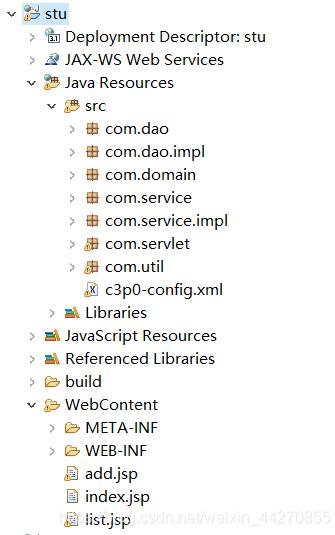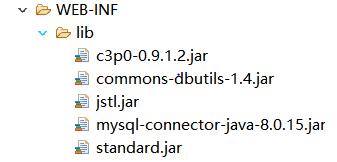这是一个很简单的学生信息管理系统,会用到很多小知识,比如说:
- 数据库连接池
- DBUtils
- JSP、EL、JSTL
- MVC设计模式
JavaWeb之简单的学生信息管理系统(一)
JavaWeb之简单的学生信息管理系统(二)
JavaWeb之简单的学生信息管理系统(三)
一、需求分析
实现一个简单的学生信息管理系统,具体实现功能有如下:
1.查询学生的息并列表展示
2.添加学生信息
3.删除学生信息
4.更新(修改)学生信息
5.模糊查询
二、准备工作
1. 创建数据库stus以及创建数据库表stu
|
1
2
3
4
5
6
7
8
9
10
11
|
CREATE DATABASE stus; USE stus; CREATE TABLE stu ( sid INT PRIMARY KEY AUTO_INCREMENT, sname VARCHAR (20), gender VARCHAR (5), phone VARCHAR (20), birthday DATE, hobby VARCHAR(50), info VARCHAR(200) ); |
2. 项目框架

3. 导入项目需要的jar包

4. C3P0的配置文件c3p0-config.xml
|
1
2
3
4
5
6
7
8
9
10
11
12
13
14
15
|
<c3p0-config> <default-config> <property name="driverClass">com.mysql.cj.jdbc.Driver</property> <property name="jdbcUrl">jdbc:mysql://localhost/stus?useUnicode=true&characterEncoding=utf8&serverTimezone=GMT</property> <property name="user">root</property> <property name="password">root</property> <property name="initialPoolSize">10</property> <property name="maxIdleTime">30</property> <property name="maxPoolSize">100</property> <property name="minPoolSize">10</property> <property name="maxStatements">200</property> </default-config></c3p0-config> |
三、代码准备
1. 实现Student类
【备:com.domain包下的Student.java】
|
1
2
3
4
5
6
7
8
9
10
11
12
13
14
15
16
17
18
19
20
21
22
23
24
25
26
27
28
29
30
31
32
33
34
35
36
37
38
39
40
41
42
43
44
45
46
47
48
49
50
51
52
53
54
55
56
57
58
59
60
61
62
63
64
65
66
67
68
69
70
71
72
73
74
75
76
77
78
|
package com.domain;import java.util.Date;/** * 这是封装的学生对象Bean * @author Administrator * */public class Student { private int sid; private String sname; private String gender; private String phone; private String hobby; private String info; private Date birthday; public Student() { super(); } public Student(String sname, String gender, String phone, String hobby, String info, Date birthday) { super(); this.sname = sname; this.gender = gender; this.phone = phone; this.hobby = hobby; this.info = info; this.birthday = birthday; } public int getSid() { return sid; } public void setSid(int sid) { this.sid = sid; } public String getSname() { return sname; } public void setSname(String sname) { this.sname = sname; } public String getGender() { return gender; } public void setGender(String gender) { this.gender = gender; } public String getPhone() { return phone; } public void setPhone(String phone) { this.phone = phone; } public Date getBirthday() { return birthday; } public void setBirthday(Date birthday) { this.birthday = birthday; } public String getHobby() { return hobby; } public void setHobby(String hobby) { this.hobby = hobby; } public String getInfo() { return info; } public void setInfo(String info) { this.info = info; } } |
2. 写一个类,判断字符串是否相等【TestUtils.java】
|
1
2
3
4
5
6
7
8
9
10
11
12
|
package com.util;public class TestUtils { /** * 判断某一个字符串是否为空 * @param s * @return */ public static boolean isEmpty(String s) { return s == null || s.length() == 0; }} |
3. JDBCUtils02.java
|
1
2
3
4
5
6
7
8
9
10
11
12
13
14
15
16
17
18
19
20
21
22
23
24
25
26
27
28
29
30
31
32
33
34
35
36
37
38
39
40
41
42
43
44
45
46
47
48
49
50
51
52
53
54
55
56
57
58
59
60
61
62
63
64
65
66
67
68
69
70
71
72
73
74
75
76
77
78
79
80
81
82
83
84
85
|
package com.util;import java.sql.Connection;import java.sql.ResultSet;import java.sql.SQLException;import java.sql.Statement;import javax.sql.DataSource;import com.mchange.v2.c3p0.ComboPooledDataSource;public class JDBCUtil02 { static ComboPooledDataSource dataSource = null; static{ dataSource = new ComboPooledDataSource(); } public static DataSource getDataSource() { return dataSource; } /** * 获得连接对象 * @return * @throws SQLException */ public static Connection getConn() throws SQLException{ return dataSource.getConnection(); } /** * 释放资源 * @param conn * @param st * @param rs */ public static void release(Connection conn , Statement st , ResultSet rs){ closeRs(rs); closeSt(st); closeConn(conn); } public static void release(Connection conn , Statement st){ closeSt(st); closeConn(conn); } private static void closeRs(ResultSet rs){ try { if(rs != null){ rs.close(); } } catch (SQLException e) { e.printStackTrace(); }finally{ rs = null; } } private static void closeSt(Statement st){ try { if(st != null){ st.close(); } } catch (SQLException e) { e.printStackTrace(); }finally{ st = null; } } private static void closeConn(Connection conn){ try { if(conn != null){ conn.close(); } } catch (SQLException e) { e.printStackTrace(); }finally{ conn = null; } }} |
以上就是本文的全部内容,希望对大家的学习有所帮助,也希望大家多多支持服务器之家。
原文链接:https://blog.csdn.net/weixin_44270855/article/details/104236494













